Yoga for a Healthy Lower Back (37 page)
Read Yoga for a Healthy Lower Back Online
Authors: Liz Owen

Sit up tall on your mat in a cross-legged position. You'll need to be able to bend forward easily from your hip joints and keep the front of your trunk long, so if your knees are higher than your groins or if your lower back is collapsing, sit on a folded blanket or bolster.
Lift your arms up and take a deep, full inhalation. As you quickly and forcefully exhale, reach your arms down to the floor in front of your trunk and place your fingertips on the floor (or on blocks if your hips are on a bolster). Look down, but do not allow your head and chest to collapse into a full forward bend. Hold your breath without inhaling while you strongly draw your whole abdominal area back toward your spine and up toward your chest (
fig. 5.8
). Lift your trunk, tuck your chin slightly (but keep your upper chest open), and roll your shoulders back. Hold Abdominal Lock only as long as your endurance allowsâyou shouldn't feel any pressure or tension in your eyes, tongue, or temples.
Release Abdominal Lock, take a deep, full inhalation, then return to sitting upright. Take a few normal breaths and observe the powerful effect Uddiyana Bandha has had on your energetic body. Repeat Abdominal Lock two more times. After you're finished, lie down on your back with your hands on your abdomen and visualize the energy of your lower body and upper body combined, the two energies becoming consistent, uniform, and pure.
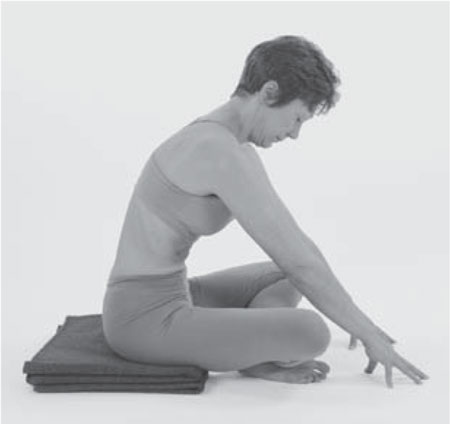
FIG. 5.8
Reclining Leg Circles
Strengthen | Urdhva Prasarita Padasana Variation 2
Start in
Upward-Legs Pose
with your head cradled in your hands, or place your hands under your hips to support your lower back. Keep your abdominal wall knitted together and firm. Exhaling, bend your knees slightly toward your chest (
fig. 5.9
). With an inhalation reach your legs away from your chest (
fig. 5.10
) and lift them up toward the ceiling, bringing them back to the vertical position (
fig. 5.11
).
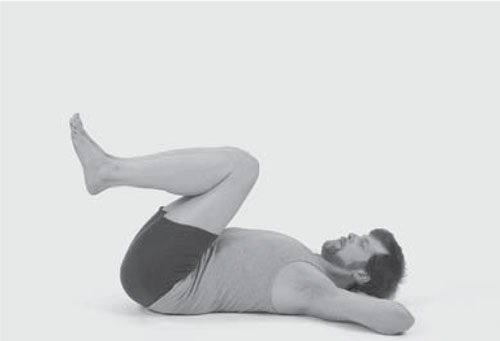
FIG. 5.9
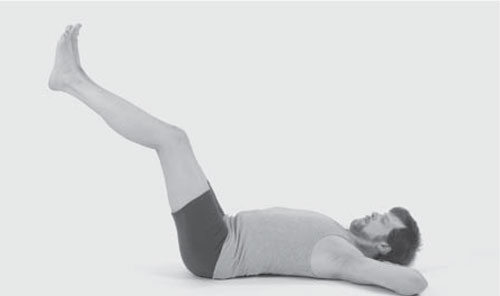
FIG. 5.10
You've now completed one Reclining Leg Circle. Practice a few times by tracing small circles in the air with your feet, imagining you are pedaling a bicycle that has only one pedal. If your lower back feels comfortable, make the circles a little bigger. Practice five or six circles and bring your knees into your chest to rest for a few moments.
Now you'll change the direction of your circles. From your starting position in Upward-Legs Pose, take your feet away from your body as you exhale. Inhaling, bend your knees and bring them toward your chest, and finish your circle by reaching your legs back up to the ceiling as you exhale. Repeat five or six circles in this direction, tracing larger circles if your lower back is comfortable. When you are done, rest with your knees into your chest, gently moving them from to side to side to massage your sacrum.
You can feel the strengthening power of Reclining Leg Circles by resting your legs down on the floor and placing your hands on your pelvis when you're finished. Feel the warmth in your hips and sense the energy you have created there.
As you rest after this pose, let me briefly introduce a concept from Taoism, the Chinese religion mostly known through the writings of the ancient teachers Lao-tzu and Chuang-tzu. In Taoist philosophy, all movements that stimulate the lower abdominal area invigorate the physical and energetic center of gravity in your body called the
xia dantian.
18
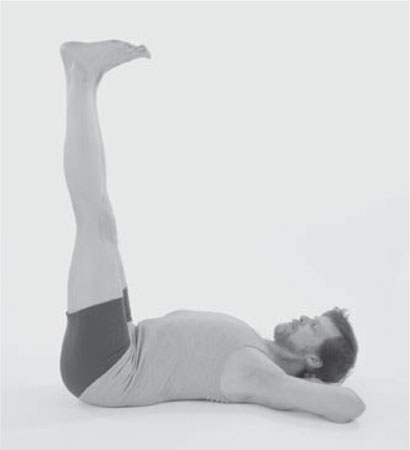
FIG. 5.11
This energetic focal point is a place of deep inner strength and peace, a combination of physical, energetic, and emotional grounding and fluidity. Each of our body's three
dantians,
meaning “seas of energy,” is a focal point of chi (vital energy) in the body. It's not a coincidence that the lower dantian corresponds almost exactly with the yogic notion of Svadhisthana chakra, the place where prana (life force) gathers. As one Taoist states, “The more life force one has, the stronger and healthier one is bound to become.”
19
All the more reason to invest the time and energy in toning, invigorating, and strengthening your abdominal core!
Leg-Lifts Cycle
Strengthen | Urdhva Prasarita Padasana Vinyasa
Leg-Lifts Cycle is a rigorous
vinyasa,
a cycle of sequential movements, requiring a good amount of abdominal stability in order to maintain comfort in your lower back. You'll practice this sequence step by step, starting with your knees bent and progressing to lifting one straight leg at a time; finally, if your lower back is agreeable, you'll practice it with both legs straight and lifting together.
Steps 1 through 3 are not yoga poses per se; rather, they are important preparatory steps to ready your body for step 4, the yoga pose called Two-Legs Lift (with Straight Legs). Practice each step the same way you practice any yoga poseâwith mindful attention and continuous, deep breathingâand you'll build tone in your abdominal core while your mind stays cool and calm. Be sure to rest between each step and listen to the feedback of your lower back. Practice each of the next steps only when you feel ready.
I am instructing you to exhale when you lift your legs up and when you take them downâthat's because I believe practicing both movements that way is the key to a leg lift that fully engages the abdominal muscles. It's much easier to draw your navel down toward your spine and knit your abdominal wall together on an exhalation, and breathing out also helps keep your lower back long, reducing your chance of straining your lower back or overusing your psoas (hip flexor) muscles. After you've practiced each step,
take a few moments to rest with your legs flat on the floor to release any tension in your psoas muscles, then hug your knees to your chest for a few breaths before moving on to the next step.
Step 1: One-Leg Lift (with Other Leg Bent)
Lie on your back with your legs bent and your feet flat on the floor. Place your arms overhead on the floor or take your hands under your hips for more lower back support. As you exhale, draw your right knee into your chest and lift your leg straight up so it is perpendicular to your body (
fig. 5.12
). With your next exhalation, lower your right leg straight down to the floor. Rest for a few breaths and reverse the steps, lifting your leg back to the ceiling and bending your knee into your chest as you exhale. Repeat three times with each leg.
Step 2: One-Leg Lift (with Other Leg Straight)
Repeat step 1, this time with your nonlifting leg flat on the floor. Keep your “down” leg active by pressing out through your heel and drawing your toes toward your knee. And although I might sound like a broken record, I'll say it again: before you begin the pose, knit your abdominal wall together any amount possible. Repeat three times with each leg.
Step 3: Two-Legs Lift (with Knees Bent)
Lie on your back with your legs bent and feet flat on the floor. If you feel confident in the strength of your lower back, straighten your arms onto the floor behind your head. Otherwise, place your hands, palms down, underneath your hips. As you exhale, bring your knees one at a time into your chest (
fig. 5.13
). Hold them there as you inhale, and with your next exhalation straighten them both up to the ceiling. Keep your knees bent if any discomfort comes while you're straightening your legs. Inhaling, bring your knees back into your chest, and with your next exhalation, stretch your legs straight out along the floor with your toes pointed to the ceiling. With your next exhalation, bend your knees and place your feet flat on the floor, coming back to your starting position. Repeat Bent-Leg Lift two more times.
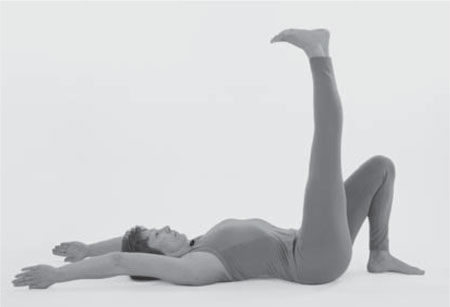
FIG. 5.12
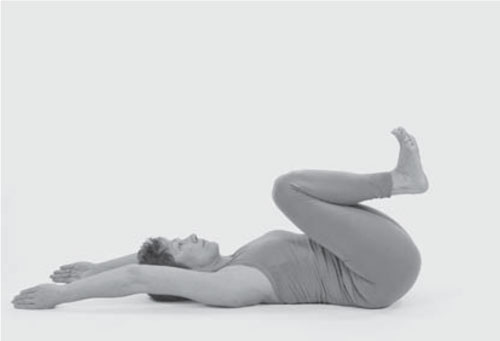
FIG. 5.13
Step 4: Two-Legs Lift (with Straight Legs)
This is the most challenging step in the cycle, and caution is advised. Your lower back should feel absolutely comfortable in the previous steps before you practice this step. If you experience twinges or discomfort anywhere in your lower back, release the pose immediately. Practice steps 1 through 3 until your abdominals strengthen.
Lie on your back with your legs flat on the floor. Place your arms overhead on the floor or take your hands under your hips to support your lower back. You may wish to place a folded blanket under your hips. Take a deep inhalation and as you exhale, lift your legs up to ninety degrees from the floor. Hold your legs up as you inhale, and as you exhale, take your legs straight down to the floor. Repeat three times.
